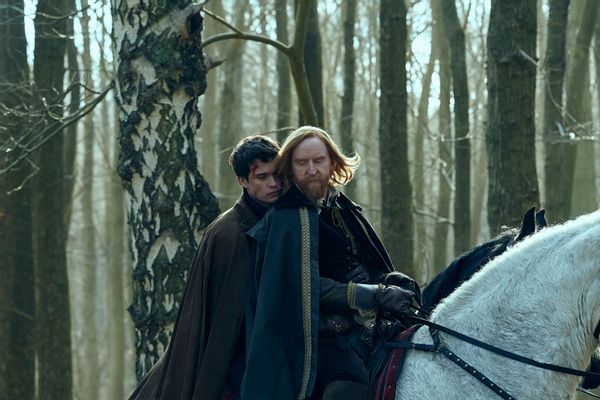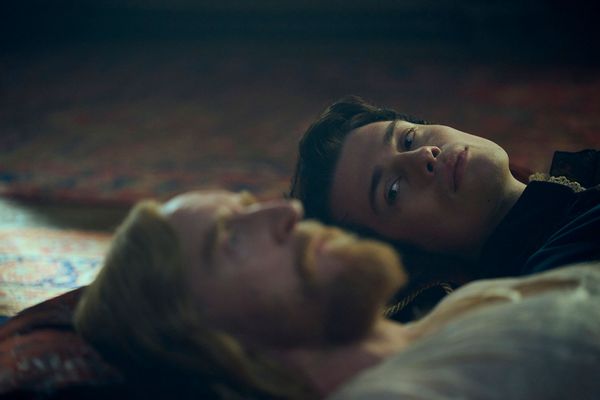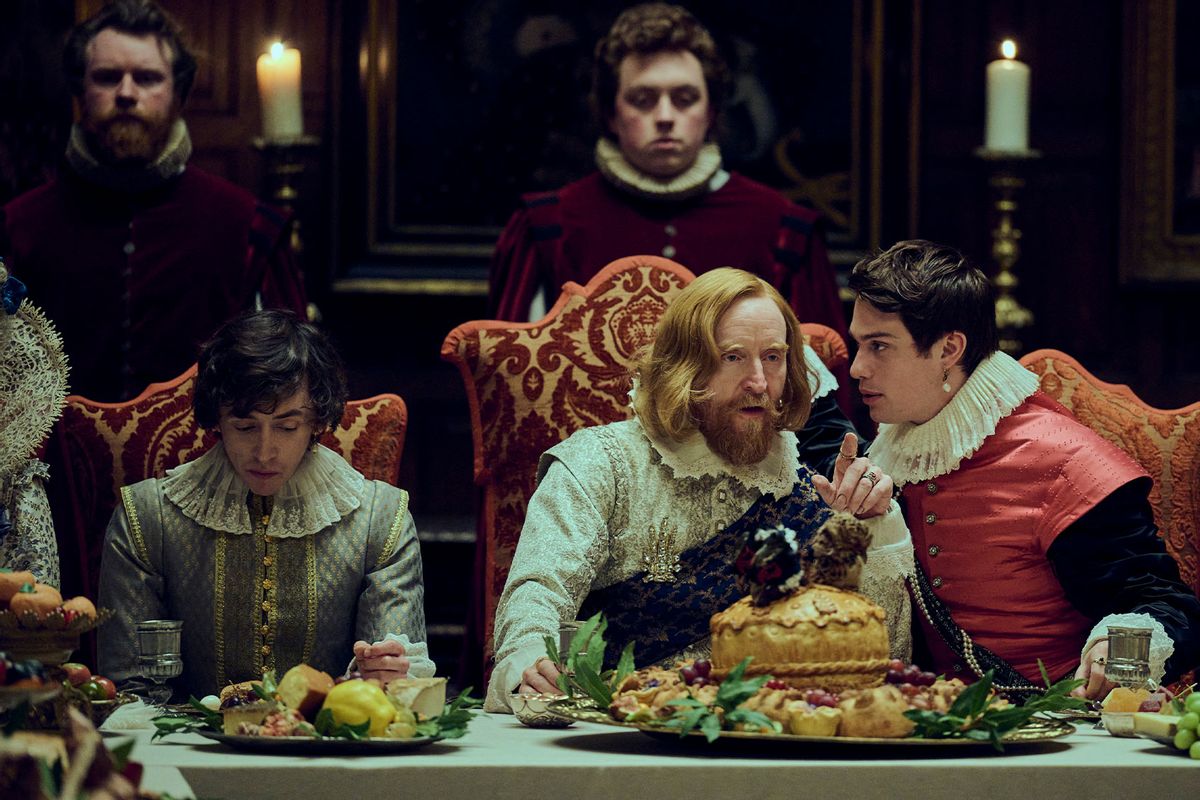King James I crouches near the foot of an ornate, golden bed wearing only linen pants. George Villiers, his beautiful young lover, sits naked on the floor, nursing a crescent-shaped open wound on his forearm. It’s a bite mark, sustained by the king.
“Poor lamb and poor wolf — on the edge of the dark, dark woods,” King James says, his hand sliding languidly over George’s shoulder. “Do we enter? Or no? No, no, no.”
“What really informed me . . . was looking into the eyes of King James, of looking at paintings.”
This erraticism is spurred by a vulnerability in King James that Tony Curran, who portrays the Jacobean era monarch in Starz’s 17th-century period drama series, “Mary & George,” found especially compelling about the character. “I think there are elements to James, where he just wants to take a bite or something,” Curran tells Salon, laughing. “It happened to be poor George, sadly.”
The wound functions on a figurative level, too. It’s as though James projected his own tortured inner world onto George, physically marking him with impassioned fierceness while simultaneously sharing a wounded piece of himself.
Prior to “The Wolf and the Lamb,” the fourth and latest episode of the show to premiere, viewers have already gotten a glimpse into King James and George’s (Nicholas Galitzine) budding relationship. Mary Villiers, played by Julianne Moore, has successfully ingratiated herself into the royal ranks by using George as a sexual chess piece; despite her lowly peasant background, Mary’s thoughtful scheming has paid off — thus far.
After the king’s previous lover, Robert Carr, the Earl of Somerset (Laurie Davidson) is executed, it seems as though Mary and George have a clear path toward continued ascension. That is until Friday’s episode, wherein George becomes bedmates with the Earl’s cousin, Peter Carr, igniting a rift between him and James. However, they ultimately reunite once Peter’s true intentions are revealed after he attempts to kill George to avenge the Somersets’ deaths.
During a moment of reconciliation, James tells George about his first great love, the late Lord Lennox. He reveals how Lennox arranged to have his heart embalmed and sent to James after his death, telling George that he had it buried above Edinburgh in “a quiet, secret spot.”
“But I decidedly recently to bring him home,” James adds tearfully, explaining the reason behind his trip to Edinburgh. “Am I a lovesick fool?” he asks George, who assures him that he is not.
Speaking to Salon, Curran talked about King James’ layered emotional complexity, and how those fickle feelings extend into his relationship with George Villiers.
The following interview has been edited for length and clarity.
Tony Curran as King James I in “Mary & George” (Starz)I’m really curious to learn how much research you did on King James ahead of taking on the role. What specifically about him unlocked your interest in the character?
When I managed to read through all the scripts, it was clear to me that this was going to be quite challenging. But I also relished that, and it was a real joy to get an audition for it. Of course, getting offered [the part], I was really thrilled. The first thing I did was delve into the novel that Benjamin Woolley wrote. I did a deep dive on YouTube. It’s incredible how much you can unearth. And I’m still finding things.
But a lot of what really informed me and helped me was actually was looking into the eyes of King James, of looking at paintings. I saw a sort of vulnerability and a sadness in his eyes. And also talking to Benjamin Woolley, who wrote the non-fiction novel about George and the Villiers and King James, “The King’s Assassin.” I spoke to him for like two-and-a-half, three hours, and I would also call him up and have Zoom calls with him. It was just the idea of, well, obviously, King James is a monarch we’ve never really heard much about on screen, on stage, and that was exciting to me. I was like to Benjamin Woolley, “Where’s he coming from, this guy? What makes him tick?” He’s a very little known king. He was only on the British throne for 23 years. He’d been a king since he was 18 months old, after Mary Queen of Scots was executed.
Yeah, I was gonna say he had a kind of traumatic upbringing in a lot of ways.
I think that was what was most compelling to me was my [character’s] father, Lord Darnley, was assassinated. Mary Queen of Scots was executed by Queen Elizabeth I. I’d been kidnapped once when I was 13 years old for a year. It was a constant traumatic upbringing. And I think that, I thought that was a compelling part of his makeup that we try to bring into this work. This person, this man, this husband, this king, this son, this father, this lover – I think he was deeply, deeply wounded, and he had such trauma in his past life and his ongoing life. And I think that’s what made me want to play that role. I found that really interesting to try and portray as well as his love affairs with Lord Lennox, Robert Somerset and George Villiers.
“I think his love for a lot of these men was quite profound and quite true.”
Me and Benjamin Woolley talked about it. I was like, “Look in his eyes? What am I looking for?” He goes, “Well, tell me what you think.” And I used to think, “He looks like a man who doesn’t want to be there. He doesn’t really want to be a king. He doesn’t really want to be sitting on that throne.”
One of the terms Benjamin came up with that I thought was very helpful was that King James is nourished in fear. I wrote it in the back of the novel and I’d always have the novel in my trailer or wherever I was shooting, just to remind myself of his paranoia. But I think a lot of his paranoia was justified.
 Nicholas Galitzine as George Villiers and Tony Curran as King James I in “Mary & George” (Starz)Yeah, I think the vulnerability that you’re getting at is really interesting. There’s a really deep intensity and humanity in your portrayal of the king, especially I think as it relates to his relationship with George. Is that something that you wanted to emphasize? Their relationship starts out as somewhat transactional, but it begins to evolve into something more profound. It almost feels like it’s got this ever-oscillating nature of, “How do we define this relationship between these two men?”
Nicholas Galitzine as George Villiers and Tony Curran as King James I in “Mary & George” (Starz)Yeah, I think the vulnerability that you’re getting at is really interesting. There’s a really deep intensity and humanity in your portrayal of the king, especially I think as it relates to his relationship with George. Is that something that you wanted to emphasize? Their relationship starts out as somewhat transactional, but it begins to evolve into something more profound. It almost feels like it’s got this ever-oscillating nature of, “How do we define this relationship between these two men?”
Yeah, that’s a good point. I’ve said before that he’s looking for a relationship, he’s looking for loyalty, he’s looking for something deep inside of him that he wants nourished, he wants a hole to be filled. And I think a lot of that has to do with how there was no matriarchal figure in his life. I’ve got a friend who’s a doctor or a psychologist and I was discussing this with her — about the idea of not being brought up and having a mother, and how profound and how fortunate and how lucky we are when you have both parents or maybe you only have one parent.
But James didn’t have any parents. His father was assassinated, his mother was executed. He was brought up by these white, Calvinistic regents and he was educated in the ways of the world and languages and academia and so on. But I think within any human being if you don’t have a mother or a father there — or certainly, if you don’t have a matriarchal figure or a mother — I think that definitely had a hugely profound effect on who James became and how worked his way through life with these relationships, with these men. Obviously, he was married to Queen Anne and he had children, but I think that he wanted heirs — that was expected of him.
But I think his love for a lot of these men was quite profound and quite true. And there’s no doubt that as an individual, he was damaged in many ways, but he was trying to find ways to distract himself. One thing I said before is that, if you can’t find meaning in life, you’ll find distraction. And I think James, he was trying to find meaning, but then I think he was distracted as well by his lascivious exploits. At the same time he was expressing himself.
I think the sensuality and sexuality that’s in the show, even with Julianne’s character and Niamh Elgar — with Mary and Sandie — I think those relationships became more than just essential exploits. They became quite tender and romantic and loving. And I think with James and George that was certainly there as well. I don’t doubt that he cared for George Villiers deeply.
I am interested to learn more about how James sees George. Obviously, they do share this intimate dalliance of sorts, but it’s still a relationship born out of Mary’s ulterior motive of wanting to ascend into wealth and the upper echelons of royal society. So I’m wondering if you felt like James ever suspected that he was being used for power, or would you say maybe that he was used to that because he was a king and somewhat of a political target in that sense?
I like that word, dalliance. It’s a good word!
I think he, of course, suspected that these people had ulterior motives. There was a term people would say about King James, that he’s the wisest soul in Christendom. He was canny, he was a thinker. But at the same time, I think if he was to go with his gut feeling — with all these men and women that pass through his court — I think if there was a small percentage of doubt, then nobody would come through his court. I think certainly with the Villiers and with Somerset, he wanted to believe that these people cared about him. In many ways, I guess he had to believe that they cared about him. He wanted that connection, he wanted that compassion, and he wanted to feel that loyalty from these individuals because of his traumatic past and what’s happened to him.
So anybody that came into his court, as you mentioned, I think he’d feel like maybe they have an ulterior motive, but in many ways, I think it’s sort of quid pro quo with James. And when George started taking on some of the political agenda of the time — taking on the heavy lifting, if you will — I think James was OK with that. He was like, “Yeah, you do that, just don’t step out of line.”
 Tony Curran and Nicholas Galitzine in “Mary & George” (Starz)In one of the first scenes of Episode 4, “The Wolf and the Lamb,” we see the king tenderly caressing a sleeping George in bed before biting his arm very aggressively. That seemed like it took a lot! What went into that scene?
Tony Curran and Nicholas Galitzine in “Mary & George” (Starz)In one of the first scenes of Episode 4, “The Wolf and the Lamb,” we see the king tenderly caressing a sleeping George in bed before biting his arm very aggressively. That seemed like it took a lot! What went into that scene?
It was funny, that was actually one of the scenes I auditioned with. It was pretty much self-mutilation at that point. I was biting into my own arm. Nicholas, fortunately, wasn’t there at the time.
There’s a lot of vulnerability in this show and none more so than when you’re lying in bed with someone naked. There’s a moment of madness that comes over James, I guess. This sort of ravenous wolf — is he the wolf? Who’s a wolf in sheep’s clothing? In many ways, it’s how unpredictable the world is and how James is in that episode. He fluctuates from tenderness to almost wrathfulness. I found it very interesting to play that sort of unpredictability of him and how he changes and George, as he says to his mother something like, “I don’t know how to behave in front of him. His mood changes, fleetingly, momentarily. I don’t know how he’s gonna behave.”
But I think a lot of that and those moments came from sort of a deep, dark, darkness within James. I’m not sure if someone could have diagnosed James back in the day whether he would be clinically depressed. But I think a sort of bipolarism if you will — these mood swings that are so joyous and fun to very dark and unpredictable.
Was there anything specific that you and Nicholas did ahead of filming to create chemistry or intimacy or just a level of comfortability where you could do a scene like that?
We didn’t really rehearse too much, actually. We met and we had dinner with [director] Oliver Hermanus, our fearless leader, and we just talked about the scenes. We just discussed, “Where’s your head at at this point?”
“if you can’t find meaning in life, you’ll find distraction.”
Obviously, Mary Villiers is putting this young man into the lion’s den, if you will. And there’s so much unpredictability to James. But no, I just think we just talked about where our characters were coming from and what our objectives may have been. We didn’t really have a lot of time to rehearse together. I think a lot of what helped us within that was David’s [D.C. Moore] script, because it was all there on the page. You can do as much research as you can if you feel like that is your MO as an actor — which I like to, I like to delve into it. But when it comes down to it, it’s the old quill: what’s on the page. And your instinct for the character and the fact that the director or producers have entrusted you with this role.
Thinking specifically, 1) about the King’s relationship with George, and then 2) the way the show portrays queerness — albeit Jacobian-era queerness — more broadly, why do you feel that it’s important that this story was portrayed on screen as a period drama?
I think Oliver Hermanus put it quite beautifully when he said that it’s not ostensibly a queer story. It’s a period in history. It happens to be a period of history that has a fluidity to it, that had a queer king.
So I think that it’s important to tell these stories to highlight areas of society. Unfortunately, there are people within our world who have a bone to pick with people because of their color, their sexual orientation, their background. And a lot of that has to do with ignorance and sadly that sort of approach to life. I think there are a lot of things we can highlight. And I think there’s empathy and compassion and understanding that can also be, hopefully, brought out in people to tell these stories about these people, about their lives.
We don’t really see too many statues of King James in London. I had to search for it when I was there and I found it at Temple Bar, which is sort of in the old city of London. Is that because he wasn’t a warmongering king? He calls himself Rex Pacificus or Great King of Peace. Is it because he was a Scotsman put on an English throne? It could be, or because he was queer. I guess that was sort of swept under the rug — “Oh, we don’t want a queer Scottish non-warmongering king.” Because that’s bad for business on the throne.
So I think it’s absolutely important to highlight these things. Cause, there are people in them, because they have lives. As heterosexual as we all are, there are LGBTQ+ people in society as well. We’re all born under the same sun.
“Mary & George” airs Fridays on Starz and on the Starz app.
https://www.youtube.com/watch?v=OYI7FtJr20c
Read more
about this topic

